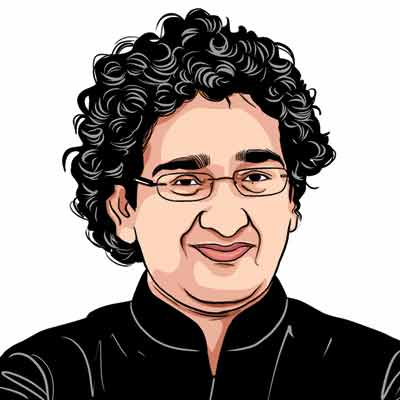Opinion Party pooper
Furious that campus elections had been postponed,students of Madhav College,Ujjain went on a rampage in 2006.
Furious that campus elections had been postponed,students of Madhav College,Ujjain went on a rampage in 2006. In the melee,H.S. Sabharwal,who taught political science,was kicked off his scooter,then beaten to death,allegedly by student leaders linked to the BJP all to the unblinking gaze of television cameras. The Supreme Court cited Professor Sabharwals murder when it accepted the Lyngdoh Committee recommendations on regulating student elections.
The Committee,headed by a former chief election commissioner,has courted controversy over two minor details: reducing the maximum age of candidates,and limiting expenditure to just five rupees thousand per candidate.
But the bigger worry is the reports aim to reduce the role that big political parties play in student elections. The report blamed party-backed student groups for the tendency… to unnecessarily politicise the election process. As a result,virtually all party-backed student groups the NSUI (Congress),the SFI (CPM) and the ABVP (BJP) were in effect debarred from standing in the recently-concluded Delhi University Student Union elections. This was also why,when the votes were counted,an Independent had won.
Lyngdohs assumption that for student politics to be clean,it must be divorced from party politics outside,is shared by many in the middle class: the belief that representation is best done by small tightly-knit groups,that large political parties,venal and authoritarian,somehow sully it. It is part of the American romance with town-hall politics,the same romance that glorifies consensual decision-making in panchayati India.
But small in our political context means the clutch of regional and caste-based parties that have prospered since the 1970s. It can be nobodys case that the Samajwadi party,the BSP or the DMK are any less venal than national parties like the Congress or the BJP. Some even smaller parties,such as Ram Vilas Paswans LJP or Ajit Singhs RLD are one-man shows shorn of even the pretence of cadre-based decisions. That leaves the Independents,the smallest of parties,their naiveté matched only by their irrelevance. In the last elections,south Mumbai candidate Meera Sanyal,a clean-corporate type empowered after 26/11,lost her deposit. She probably got more column inches than votes.
The Lyngdoh Committee recommendations may even be self-defeating. While it is difficult to defend Indias opaque party system,the student wings of these parties are often the only democratic feeders into a nepotistic,filial party structure. Take,as a very small sample-set,the young (under 40) leaders in the current Lok Sabha. Of 81 young MPs,a full 50 have relatives in politics. Of the remaining,almost thirty per cent made their bones in student politics. In other words,if you are ambitious but without a family base,student politics is a major way to enter party structures and become a leader. The Lyngdoh committee assumes that party politics will corrupt student politics,but it ignores the reverse: student politics often purifies parties outside. By assuming the mendacity of outside parties and cutting off their only source of young blood,the committees prophecy will self-fulfil. Had these measures been implemented a generation earlier,we would have been denied many leaders who currently romp across the national stage leaders such as Arun Jaitley,Anand Sharma,and the entire CPM top brass who came up without godfathers. Who knows how many budding careers will be cut short by these recommendations?
One view of Indian politics is that its beyond redemption. In this reading,everybody is corrupt and change is impossible; better that colleges produce their own pure politics. There is,then,the hopeful view,that politics within campus rejuvenates politics without.
The Sabharwal murder case is,well,a case in point. Despite video evidence,replayed in endless loops across India,the six accused were acquitted; a reluctant court blamed the police,and ignored the video for procedural reasons. These are flaws in the police and judicial system that cant be solved by just cleansing campuses,but by cleansing the world outside,a world made up of parties and students who join them.
Creases on age and cash restrictions in student elections will likely iron itself out in the coming years. But the Lyngdoh Committees central belief,that the big boys must be kept out,wont. Welcome to the new Indian campus sanitised and banner-free,but so utterly irrelevant.
vinay.sitapati@expressindia.com


